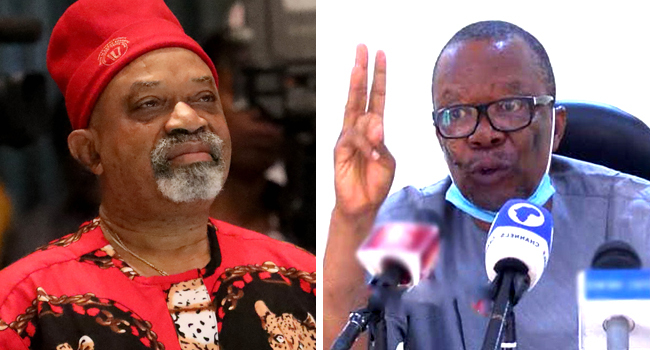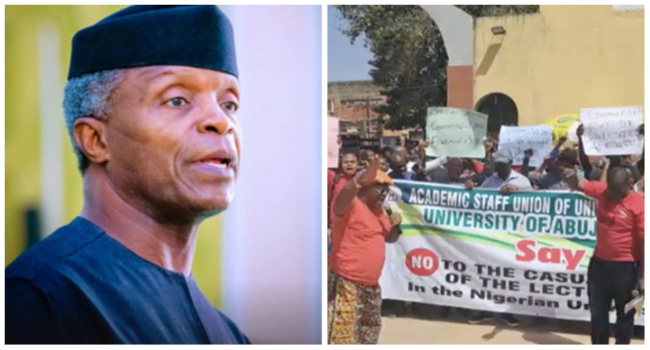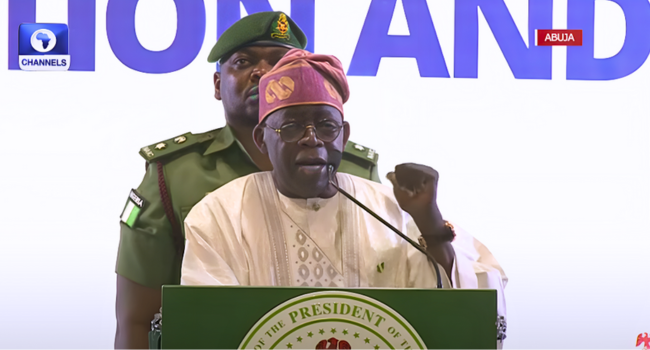In the light of recent agitations by the Academic Staff Union of Universities (ASUU), Vice-President Yemi Osinbajo has said the Federal Government is planning to review the university autonomy laws.
This comes weeks after ASUU called off an eight-month strike, which saw its members demanding improved welfare, revitalisation of public universities, and academic autonomy, among others.
Osinbajo was represented by the Secretary to the Government of the Federation, Boss Mustapha at an event organised by the National Universities Commission (NUC) in Abuja to mark the 60th anniversary of the NUC and launch of the Core Curriculum Minimum Academics Standards (CIMAS).
READ ALSO: Alleged Misconduct: Again, NBA Writes BOB Chairman, Olanipekun, Insists On His Recusal
The vice president stated that one of the major issues bedevilling university education in Nigeria was the incessant strike actions by various unions in public universities.
“The most recent strike actions by the university-based unions have necessitated a revisit on the issues and scope of university autonomy by government,” he said.

“This will lead to a review of the university autonomy laws to appropriately address funding, including staff remuneration, institutional governance, and administration, as well as issues relating to internally generated revenue.”
According to him, the university system has cumulatively lost over 50 months from 1999 to date as a result of strike actions by ASUU.
“I doubt if there is any country that has lost such amount of time to strikes in its university system.
“From the first strike in 1978 to date, all the issues have remained the same. The agitations have been primarily on funding, university autonomy, and remunerations.
“I need to stress here that government alone cannot fund education in the country. It is therefore imperative that a sustainable model of funding university education must be developed,” he said.

Osinbajo applauded what it described as the foresight of the NUC in unbundling such disciplines as Agriculture, as well as the emergence of three new disciplines, namely Allied Health Sciences, Architecture and Communication, and Media Studies.
The launch of CIMAS, he said, would usher in a new era in the delivery of quality and relevant content.
For the greater part of 2022, the country’s public universities have been crippled by industrial action over the demands of their academic workers, including the non-payment of university revitalisation funds amounting to about N1.1 trillion.
Following a court ruling in October, ASUU called off its strike. However, its relationship with the Federal Government has remained contentious.

At the end of October, the academics received part payment from the Federal Government, prompting a one-day nationwide protest in November.
However, the Speaker of the House of Representatives, Femi Gbajabiamila said the ‘no work, no pay’ policy embarked on by the Federal Government during the period of strike is premised on the law.
He added that the decision is based on the government’s legitimate interest in preventing moral hazard and discouraging disruptive industrial actions.
The Federal Government also defended the pro-rata payment, saying the workers could not be paid for work not done.
According to the Minister of Education, Adamu Adamu, the lecturers were paid what is due to them.
Similarly, the Minister of Labour and Employment, Chris Ngige, through the spokesman for the ministry, Olajide Oshundun, dismissed media reports that the government was biased in paying the university teachers.
But the National President of ASUU, Prof Emmanuel Osodeke blamed Ngige for allegedly authorising the part payment, describing him as an “interloper.” He further expressed confidence in the Federal Government to resolve ASUU’s agitations.




